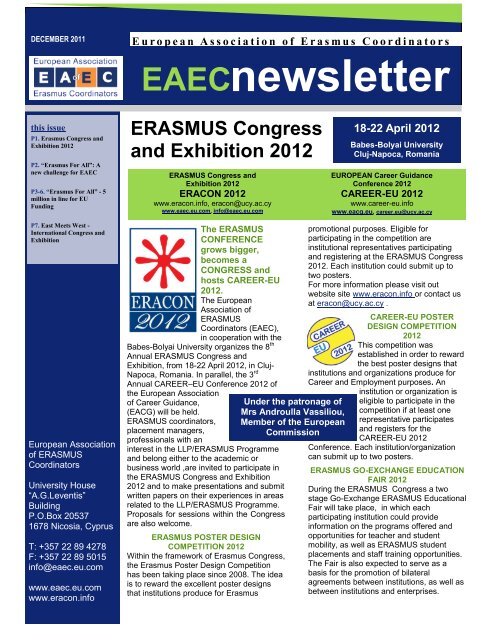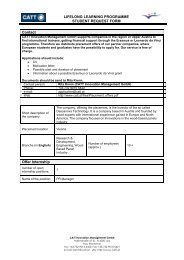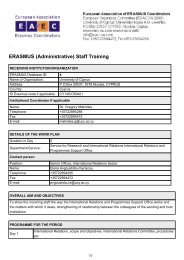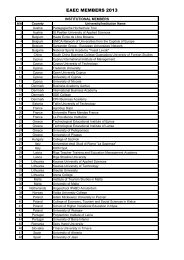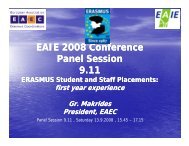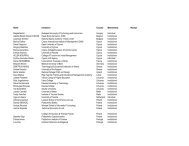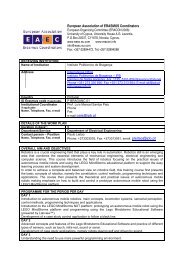EAEC Newsletter December 2011.pdf - European Association for ...
EAEC Newsletter December 2011.pdf - European Association for ...
EAEC Newsletter December 2011.pdf - European Association for ...
You also want an ePaper? Increase the reach of your titles
YUMPU automatically turns print PDFs into web optimized ePapers that Google loves.
DECEMBER 2011<br />
E u r o p e a n A s s o c i a t i o n o f E r a s m u s C o o r d i n a t o r s<br />
<strong>EAEC</strong> newsletter<br />
this issue<br />
P1. Erasmus Congress and<br />
Exhibition 2012<br />
P2. “Erasmus For All”: A<br />
new challenge <strong>for</strong> <strong>EAEC</strong><br />
P3-6. “Erasmus For All” - 5<br />
million in line <strong>for</strong> EU<br />
Funding<br />
ERASMUS Congress<br />
and Exhibition 2012<br />
ERASMUS Congress and<br />
Exhibition 2012<br />
ERACON 2012<br />
www.eracon.info, eracon@ucy.ac.cy<br />
www.eaec.eu.com, info@eaec.eu.com<br />
18-22 April 2012<br />
Babes-Bolyai University<br />
Cluj-Napoca, Romania<br />
EUROPEAN Career Guidance<br />
Conference 2012<br />
CAREER-EU 2012<br />
www.career-eu.info<br />
www.eacg.eu, career.eu@ucy.ac.cy<br />
P7. East Meets West -<br />
International Congress and<br />
Exhibition<br />
<strong>European</strong> <strong>Association</strong><br />
of ERASMUS<br />
Coordinators<br />
University House<br />
“A.G.Leventis”<br />
Building<br />
P.O.Box 20537<br />
1678 Nicosia, Cyprus<br />
T: +357 22 89 4278<br />
F: +357 22 89 5015<br />
info@eaec.eu.com<br />
www.eaec.eu.com<br />
www.eracon.info<br />
The ERASMUS<br />
CONFERENCE<br />
grows bigger,<br />
becomes a<br />
CONGRESS and<br />
hosts CAREER-EU<br />
2012.<br />
The <strong>European</strong><br />
<strong>Association</strong> of<br />
ERASMUS<br />
Coordinators (<strong>EAEC</strong>),<br />
in cooperation with the<br />
Babes-Bolyai University organizes the 8 th<br />
Annual ERASMUS Congress and<br />
Exhibition, from 18-22 April 2012, in Cluj-<br />
Napoca, Romania. In parallel, the 3 rd<br />
Annual CAREER–EU Conference 2012 of<br />
the <strong>European</strong> <strong>Association</strong><br />
of Career Guidance,<br />
(EACG) will be held.<br />
ERASMUS coordinators,<br />
placement managers,<br />
professionals with an<br />
interest in the LLP/ERASMUS Programme<br />
and belong either to the academic or<br />
business world ,are invited to participate in<br />
the ERASMUS Congress and Exhibition<br />
2012 and to make presentations and submit<br />
written papers on their experiences in areas<br />
related to the LLP/ERASMUS Programme.<br />
Proposals <strong>for</strong> sessions within the Congress<br />
are also welcome.<br />
ERASMUS POSTER DESIGN<br />
COMPETITION 2012<br />
Within the framework of Erasmus Congress,<br />
the Erasmus Poster Design Competition<br />
has been taking place since 2008. The idea<br />
is to reward the excellent poster designs<br />
that institutions produce <strong>for</strong> Erasmus<br />
Under the patronage of<br />
Mrs Androulla Vassiliou,<br />
Member of the <strong>European</strong><br />
Commission<br />
promotional purposes. Eligible <strong>for</strong><br />
participating in the competition are<br />
institutional representatives participating<br />
and registering at the ERASMUS Congress<br />
2012. Each institution could submit up to<br />
two posters.<br />
For more in<strong>for</strong>mation please visit out<br />
website site www.eracon.info or contact us<br />
at eracon@ucy.ac.cy .<br />
CAREER-EU POSTER<br />
DESIGN COMPETITION<br />
2012<br />
This competition was<br />
established in order to reward<br />
the best poster designs that<br />
institutions and organizations produce <strong>for</strong><br />
Career and Employment purposes. An<br />
institution or organization is<br />
eligible to participate in the<br />
competition if at least one<br />
representative participates<br />
and registers <strong>for</strong> the<br />
CAREER-EU 2012<br />
Conference. Each institution/organization<br />
can submit up to two posters.<br />
ERASMUS GO-EXCHANGE EDUCATION<br />
FAIR 2012<br />
During the ERASMUS Congress a two<br />
stage Go-Exchange ERASMUS Educational<br />
Fair will take place, in which each<br />
participating institution could provide<br />
in<strong>for</strong>mation on the programs offered and<br />
opportunities <strong>for</strong> teacher and student<br />
mobility, as well as ERASMUS student<br />
placements and staff training opportunities.<br />
The Fair is also expected to serve as a<br />
basis <strong>for</strong> the promotion of bilateral<br />
agreements between institutions, as well as<br />
between institutions and enterprises.
<strong>EAEC</strong> <strong>Newsletter</strong>, <strong>December</strong> 2011, page 2<br />
<strong>EAEC</strong> CELEBRATES THE 25 YEARS OF THE<br />
ERASMUS PROGRAM in 2012<br />
The <strong>European</strong> <strong>Association</strong> of ERASMUS<br />
Coordinators plans the following activities <strong>for</strong><br />
celebrating the 25 Years of ERASMUS.<br />
People who were either ERASMUS<br />
Institutional Coordinators <strong>for</strong> more than<br />
15 years or have been serving as<br />
ERASMUS Institutional Coordinators<br />
since the beginning of the ERASMUS<br />
Program in their countries, could send to<br />
<strong>EAEC</strong> their nominations. Top list will be<br />
awarded with the Erasmus Minister<br />
Label.<br />
An anniversary poster design<br />
competition with the theme “25 years of<br />
Erasmus”.<br />
A special issue to mark the “25 Years<br />
ERASMUS Anniversary", in which <strong>EAEC</strong><br />
Members will present their institutional<br />
profile, as well as their ERASMUS<br />
Institutional Coordinator’s profile, will be<br />
published.<br />
THE INENTER CONFERENCE<br />
509962-LLP-1-2010-1-CY-ERASMUS-ECUE<br />
17-19 APRIL 2012, Babes-Bolyai University,<br />
Cluj-Napoca, Romania<br />
People attending the ERASMUS Congress could<br />
arrive one day earlier and take part in the<br />
INENTER project Conference without any extra<br />
registration fees.<br />
The <strong>European</strong> project INENTER which stands <strong>for</strong><br />
“Improving the placements and INternships from<br />
academia to ENTERprises”, aims to develop and<br />
apply a medium – long term quality strategy<br />
aiming at identifying needs, raising awareness,<br />
and introducing and developing actions, models,<br />
measures, tools and good practices regarding<br />
the internships and placements of students of all<br />
levels, in industry and enterprises. The<br />
partnership aims in developing a methodology<br />
and tools <strong>for</strong> measuring the quality of such<br />
activities. The project aspires to attain a better<br />
and stronger communication and cooperation<br />
between enterprises and academia, with<br />
emphasis on the placement of students in<br />
industry, as well as developing cooperation of<br />
research activity of postgraduate students that<br />
could involve enterprises.<br />
Photos from Cluj-Napoca<br />
ERASMUS FOR ALL: A New Challenge <strong>for</strong> <strong>EAEC</strong><br />
“Erasmus <strong>for</strong> All”, the EC proposal <strong>for</strong> the new programme <strong>for</strong> education, training, youth and sport (2014<br />
-2020), is about to bring together all the current related EU and international schemes, accommodating<br />
<strong>for</strong> a huge number of students, academics and professionals.<br />
This will have a direct effect on <strong>EAEC</strong>, as 7 existing different programmes will be under the umbrella of 1,<br />
in the following ways:<br />
<br />
<br />
<br />
<br />
New members (academics, professionals, organizations, institutions), from different backgrounds, will<br />
be interested in joining <strong>EAEC</strong><br />
New activities, strategic partnerships and synergies will be developed amongst <strong>EAEC</strong> members<br />
The ERASMUS Congress will be targeted to an increased number of people resulting in a larger<br />
audience<br />
New themes to be covered and discussed within the ERASMUS Congress will arise<br />
All the above will result in <strong>EAEC</strong> becoming bigger and more influential, having a key role to play <strong>for</strong> the<br />
promotion of the new programme in the <strong>European</strong> and international arena.<br />
There<strong>for</strong>e, a new challenge <strong>for</strong> <strong>EAEC</strong> and <strong>for</strong> its members lies ahead!
<strong>EAEC</strong> <strong>Newsletter</strong>, <strong>December</strong> 2011, page 3<br />
Erasmus <strong>for</strong> All<br />
5 million in line <strong>for</strong> EU funding<br />
Up to 5 million people, almost twice as many as now, could get<br />
the chance to study or train abroad with a grant from Erasmus<br />
<strong>for</strong> All, the new EU programme <strong>for</strong> education, training, youth and<br />
sport proposed by the <strong>European</strong> Commission on 23 rd November<br />
2011. Among them would be nearly 3 million higher education<br />
and vocational students. Master's degree students would also<br />
benefit from a new loan guarantee scheme set up with the<br />
<strong>European</strong> Investment Bank Group. The seven-year Erasmus <strong>for</strong><br />
All programme, which would have a total budget of €19 billion, is<br />
due to start in 2014.<br />
The new programme will<br />
focus on EU added value<br />
and systemic impact, with<br />
support <strong>for</strong> three types of<br />
action:<br />
Learning opportunities<br />
<strong>for</strong> individuals, both<br />
within the EU and<br />
beyond;<br />
<br />
<br />
Institutional<br />
cooperation between<br />
educational institutions,<br />
youth organisations,<br />
businesses, local and<br />
regional authorities and<br />
NGOs;<br />
Support <strong>for</strong> re<strong>for</strong>ms in<br />
Member States to<br />
modernise education<br />
and training systems and<br />
promote innovation,<br />
entrepreneurship, and<br />
employability.<br />
Erasmus <strong>for</strong> All will replace seven<br />
existing programmes with one: it<br />
brings together the existing Lifelong<br />
Learning Programme (Erasmus,<br />
Leonardo da Vinci, Comenius and<br />
Grundtvig), Youth in Action, and five<br />
international cooperation<br />
programmes (Erasmus Mundus,<br />
Tempus, Alfa, Edulink and the<br />
programme <strong>for</strong> cooperation with<br />
industrialized countries). The main<br />
actions of the existing programmes<br />
will continue (i.e. learning mobility,<br />
cooperation projects and support <strong>for</strong><br />
policy re<strong>for</strong>m), but activities will be<br />
strengthened where the systemic<br />
impact is strongest and where there<br />
is a clear EU added value.<br />
The Commission is proposing an<br />
increase of approximately 70%<br />
compared to the current seven-year<br />
budget, which would allocate €19<br />
billion to the new programme in 2014<br />
-2020. The figure takes account of<br />
future estimates <strong>for</strong> inflation and<br />
includes expenditure <strong>for</strong>eseen <strong>for</strong><br />
international cooperation.<br />
Two completely new elements will be<br />
part of Erasmus <strong>for</strong> All:<br />
<br />
<br />
A loan guarantee scheme to<br />
help Master's degree students<br />
to finance their studies abroad<br />
and to acquire the skills needed<br />
<strong>for</strong> knowledge intensive jobs.<br />
The creation of 400 'knowledge<br />
alliances' and 'sector skills<br />
alliances'. Knowledge alliances<br />
are large-scale partnerships<br />
between higher education<br />
institutions and businesses to<br />
promote creativity, innovation and<br />
entrepreneurship by offering new<br />
learning opportunities and<br />
qualifications. Sector skills<br />
alliances are partnerships<br />
between education and training<br />
providers and businesses to<br />
promote employability by <strong>for</strong>ming<br />
new sector-specific curricula and<br />
innovative <strong>for</strong>ms of vocational<br />
teaching and training.<br />
Two-thirds of the funding would be spent on mobility grants to<br />
enhance knowledge and skills. The streamlined structure of the new<br />
programme – together with its significantly increased investment –<br />
means the EU will be able to deliver many more opportunities <strong>for</strong><br />
students, trainees, young people, teachers, youth workers and others<br />
to improve their skills, personal development and job prospects.<br />
Erasmus <strong>for</strong> All will also promote research and teaching on <strong>European</strong><br />
integration, and support grassroots sport.<br />
This proposal is now under discussion by the Council of the EU (27 Member States) and the<br />
<strong>European</strong> Parliament who will take the final decision on the budgetary framework <strong>for</strong> 2014-2020.<br />
More in<strong>for</strong>mation: http://ec.europa.eu/education/erasmus-<strong>for</strong>-all/
<strong>EAEC</strong> <strong>Newsletter</strong>, <strong>December</strong> 2011, page 4<br />
What is Erasmus <strong>for</strong> All?<br />
Erasmus <strong>for</strong> All is the new programme proposed by the <strong>European</strong> Commission <strong>for</strong> education, training, youth and<br />
sport. It would start in 2014 and would significantly increase the funds allocated <strong>for</strong> the development of knowledge<br />
and skills. Erasmus <strong>for</strong> All is based on the premise that investing in education and training is the key to unlocking<br />
people's potential, regardless of their age or background. It helps them to increase their personal development,<br />
gain new skills and boost their job prospects.<br />
What will Erasmus <strong>for</strong> All support?<br />
Erasmus <strong>for</strong> All will have a streamlined structure which will improve effectiveness, which means more grants <strong>for</strong><br />
students, trainees, teachers and others. The benefits <strong>for</strong> individuals will also bring benefits <strong>for</strong> the EU economy as<br />
a whole.<br />
Opportunities <strong>for</strong> mobility and cooperation will be significantly strengthened under the new programme: in<br />
particular, there will be more funding available <strong>for</strong> study, training, teaching and volunteering opportunities abroad<br />
<strong>for</strong> higher education and vocational students, trainees, teachers, trainers and youth workers. There will also be<br />
more opportunities <strong>for</strong> education and training institutions or youth organizations to engage in partnerships to<br />
exchange good practice and with businesses to promote innovation and employability, as well as greater support<br />
<strong>for</strong> IT plat<strong>for</strong>ms, such as e-twinning, to connect schools and other learning providers via the internet.<br />
The programme will support three main types of actions:<br />
Learning opportunities <strong>for</strong> individuals, both within the EU and beyond, including: study and training,<br />
traineeships, teaching and professional development and non-<strong>for</strong>mal youth activities such as volunteering.<br />
Erasmus <strong>for</strong> All would provide opportunities <strong>for</strong> learning abroad <strong>for</strong> up to 5 million people across all education<br />
and training sectors. <strong>European</strong>s would have the option to study, train or teach at higher education institutions<br />
anywhere in the world, and non-<strong>European</strong> students and staff would have more opportunities to study, teach<br />
and learn in Europe. Extending the programme beyond the EU's borders will increase the attractiveness of<br />
<strong>European</strong> higher education and at the same time support the development of higher education elsewhere in<br />
the world.<br />
Institutional cooperation between educational institutions, youth organizations, businesses, local and<br />
regional authorities and NGOs, to encourage the development and implementation of innovative practices in<br />
education, training and youth activities, and to promote employability, creativity and entrepreneurship.<br />
Support <strong>for</strong> policy re<strong>for</strong>m in Member States and cooperation with non-EU countries, with a focus on<br />
strengthening the evidence-base <strong>for</strong> policy making and exchange of good practices. Support will include the<br />
implementation of EU transparency tools, cross-country studies and support <strong>for</strong> specific policy agendas such<br />
as the Bologna (higher education) and Copenhagen (vocational education and training) processes.<br />
Two completely new elements will be part of Erasmus <strong>for</strong> All:<br />
<br />
<br />
ERASMUS <strong>for</strong> All<br />
Frequently Asked Questions<br />
A loan guarantee scheme to help Master's degree students to finance their studies abroad and to<br />
acquire the skills needed <strong>for</strong> knowledge intensive jobs.<br />
The creation of 400 'knowledge alliances' and 'sector skills alliances'. Knowledge alliances are largescale<br />
partnerships between higher education institutions and businesses to promote creativity, innovation and<br />
entrepreneurship by offering new learning opportunities and qualifications. Sector skills alliances are<br />
partnerships between education and training providers and businesses to promote employability by <strong>for</strong>ming<br />
new sector-specific curricula and innovative <strong>for</strong>ms of vocational teaching and training.
<strong>EAEC</strong> <strong>Newsletter</strong>, <strong>December</strong> 2011, page 5<br />
How will Erasmus For All differ from the current programmes?<br />
The main aim remains the same – to improve people's skills and ultimately their employability as well as to support the<br />
modernization of education and training systems. Erasmus <strong>for</strong> All would replace seven existing programmes with one: it<br />
brings together the existing Lifelong Learning Programme (Erasmus, Leonardo da Vinci, Comenius and Grundtvig), Youth in<br />
Action, and five international cooperation programmes (Erasmus Mundus, Tempus, Alfa, Edulink and the programme <strong>for</strong><br />
cooperation with industrialized countries).<br />
The main actions of the existing programmes will continue (i.e. learning mobility, cooperation projects and support <strong>for</strong> policy<br />
re<strong>for</strong>m), but activities will be strengthened where the systemic impact is strongest and where there is a clear EU added value.<br />
There are also a number of new innovative proposals, such as the Erasmus Master's degree student loan guarantee scheme,<br />
the knowledge alliances and the sector skills alliances. A single programme will result in simpler application rules and<br />
procedures, as well as avoiding fragmentation and duplication.<br />
Why do we need a new EU approach to education and training?<br />
The world was different when the existing programmes were created. We are currently experiencing one of the most<br />
tumultuous economic periods of our time. The EU has responded with a co-ordinated strategy <strong>for</strong> growth and jobs called<br />
Europe 2020 – and education and training are an integral part of this.<br />
The <strong>European</strong> job market is also changing. The number of high-skilled jobs is growing while the number of low-skilled jobs is<br />
decreasing. It is estimated that by 2020 nearly 35% of all jobs will require high skills, innovation capacity and the ability to<br />
adapt. One of the headline targets in the Europe 2020 strategy is to raise higher education attainment to 40% (from 32%<br />
now). . Erasmus <strong>for</strong> All can contribute by helping people to gain more and better skills through opportunities to study and train<br />
abroad.<br />
The other education headline target in the Europe 2020 strategy is to reduce the share of early school leavers from 14% to<br />
less than 10%. To contribute to this goal, Erasmus <strong>for</strong> All will support modernization at all levels of education and training,<br />
including school education, from early childhood to secondary level and initial vocational training. Non-<strong>for</strong>mal learning will be<br />
supported as well through youth exchanges and volunteering.<br />
How will Erasmus For All address youth unemployment?<br />
Erasmus <strong>for</strong> All will help young people to get training and skills that can increase their personal development and job<br />
prospects. Studying abroad can also increase language skills and adaptability. Studies have showed that students who have<br />
spent part of their studies abroad are more likely to take up a job abroad when entering the labour market.<br />
Erasmus <strong>for</strong> All also recognizes the importance of non-<strong>for</strong>mal learning. Evidence shows that getting a job is not just about<br />
having the right diploma; employers increasingly look <strong>for</strong> skills acquired through non-<strong>for</strong>mal learning experiences such as<br />
volunteering. Indeed, 75% of those who had participated in the <strong>European</strong> Voluntary Service said that their career prospects<br />
had improved thanks to this experience.<br />
Who will be the main beneficiaries?<br />
As the name suggests, Erasmus <strong>for</strong> All is open to all learners and trainers, through any public or private body active in<br />
education, training, youth and sport. It will support <strong>for</strong>mal and non-<strong>for</strong>mal learning experiences and activities across all<br />
sectors.
<strong>EAEC</strong> <strong>Newsletter</strong>, <strong>December</strong> 2011, page 6<br />
Will the target beneficiaries change from those supported by the existing programmes?<br />
No. The new programme will still focus on the needs of young people, whether they are pupils, students, trainees, volunteers<br />
or involved in associations. It will place more emphasis on support <strong>for</strong> teachers, trainers, in<strong>for</strong>mation officers and youth<br />
workers because of their importance as 'multipliers'.<br />
Cooperation projects will focus more on including business as partners with educational establishments and youth<br />
organizations.<br />
Schools will be encouraged to collaborate with their peers in other EU countries to enhance the impact of EU support and<br />
promote synergies between different <strong>for</strong>ms of cooperation, such as pupil and staff mobility and educational projects. As <strong>for</strong><br />
adult education, the programme will boost mobility of teachers and trainers and foster closer cross-border cooperation<br />
between organizations.<br />
Some activities supported by the current programmes will be reduced or discontinued in view of their limited systemic impact,<br />
or because they provide poor value <strong>for</strong> money or if they could be more efficiently supported through other EU funding, such<br />
as the <strong>European</strong> Social Fund (ESF). Mobility of people who are already on the job market, <strong>for</strong> instance, would be more of a<br />
priority <strong>for</strong> the ESF.<br />
What is the added value of a student loan guarantee at EU level when many Member States have their own<br />
student loan scheme?<br />
Student loan schemes exist in a number of countries, but they are often restricted to studies in national institutions or to<br />
undergraduates. Many national loan schemes have restrictions in terms of portability abroad.<br />
The proposed EU student loan facility focuses on Master's students studying in a different <strong>European</strong> country. Master degree<br />
courses are likely to be more expensive than undergraduate courses. The initiative would be complementary to national<br />
funding schemes, where they exist. .<br />
What else is the Commission doing to increase student and youth mobility?<br />
Funding is important, but money alone is not enough to make mobility a realistic opportunity <strong>for</strong> all. This will require a joint<br />
ef<strong>for</strong>t and new partnerships to remove obstacles which persist at national and regional levels. Part of this ef<strong>for</strong>t will be to<br />
improve the availability of in<strong>for</strong>mation, to ensure grants and loans are "portable" (i.e. that they can be used by students<br />
studying or training abroad) and to improve recognition <strong>for</strong> study and training results.<br />
In May, EU Education Ministers agreed on a joint plan [in the <strong>for</strong>m of a Council Recommendation] to remove obstacles to<br />
studying or training abroad.<br />
Why has the Commission decided to stop using existing names of mobility programmes such as<br />
Leonardo da Vinci, Comenius and Grundtvig?<br />
Erasmus is a name which is widely recognized by the public and strongly associated with learning abroad and <strong>European</strong><br />
cooperation. In setting up an integrated single programme, it makes sense to avoid multiple names and to capitalize on the<br />
popularity and awareness of the Erasmus brand.<br />
Which countries will be able to participate in Erasmus <strong>for</strong> All?<br />
Erasmus <strong>for</strong> All will be open to all EU Member States, Iceland, Liechtenstein, Norway, Switzerland, EU candidate countries<br />
benefiting from a pre-accession strategy and other countries in the Western Balkans.<br />
In addition, non-EU, mostly neighborhood countries, will be able to benefit from actions aimed at promoting study and training<br />
opportunities abroad, as well as youth activities.
<strong>EAEC</strong> <strong>Newsletter</strong>, <strong>December</strong> 2011, page 7<br />
Under the auspices of the<br />
Cyprus Presidency<br />
of the<br />
Council of the EU 2012<br />
The East-Meets-West on Innovation<br />
and Entrepreneurship Congress and<br />
Exhibition will be held during 1-4<br />
September 2012 at the University of<br />
Cyprus in Nicosia, Cyprus. The<br />
Congress is organized by the<br />
<strong>European</strong> Office of Cyprus and will<br />
explore new tools so as to bring<br />
researchers and enterprises together<br />
from all over the world. The Congress<br />
will serve as a highlight global event<br />
<strong>for</strong> harnessing the potential of<br />
entrepreneurship to transfer<br />
innovation ideas into products and<br />
services.<br />
More than 1000 delegates<br />
representing more than 50 countries<br />
are expected to attend the event.<br />
Cyprus’ prime location supports<br />
networking between East and West.<br />
Cyprus as an EU member state will<br />
hold the EU Presidency Council<br />
during the second six months of 2012.<br />
Sessions will involve key players who<br />
wish to network and develop<br />
partnerships. Several sessions will<br />
run in parallel on different scientific<br />
fields as well as innovative services.<br />
An Exhibition on innovation with a<br />
number of communication events is<br />
expected to host the main<br />
stakeholders of the research<br />
community and entrepreneurs from all<br />
over the world.<br />
INTERNATIONAL<br />
CONGRESS AND<br />
EXHIBITION<br />
1-4 September 2012<br />
Nicosia, Cyprus<br />
The main objective of the Congress is to promote cross-national<br />
collaboration between East and West as a tool to overcome<br />
national limitations on knowledge, financial resources,<br />
technology and services.<br />
More specifically, the Congress aims to:<br />
1. Improve links between scientific and business communities<br />
2. Promote private sector investment in science, innovation and<br />
enterprise development<br />
3. Encourage SMEs and scientists to exploit global knowledge<br />
resources<br />
4. Increase innovation financing mechanisms<br />
For these reasons, the Congress will trigger discussions on<br />
innovative policy tools and measures needed to build the<br />
necessary human capital, infrastructure and financial<br />
instruments to create and facilitate international collaborations.<br />
The Congress and Exhibition will offer:<br />
1. Round table meetings where delegates will have the<br />
opportunity to discuss issues and draw conclusions on<br />
innovation and entrepreneurship<br />
2. Sessions with international key note speakers giving the latest<br />
insights on innovation and entrepreneurship, policy and<br />
priorities<br />
3. Exhibition of innovative research outcomes, products and<br />
services, employment and career guidance services. 4 Special<br />
meetings, communication and other social events will be<br />
included in the programme<br />
CYPRUS IS THE CROSSROADS OF<br />
EAST AND WEST,<br />
LETS ALL MEET THERE<br />
www.eastmeetswest.eu.com<br />
Get on the e-mailing list...write to: eastwest2012@ucy.ac.cy


